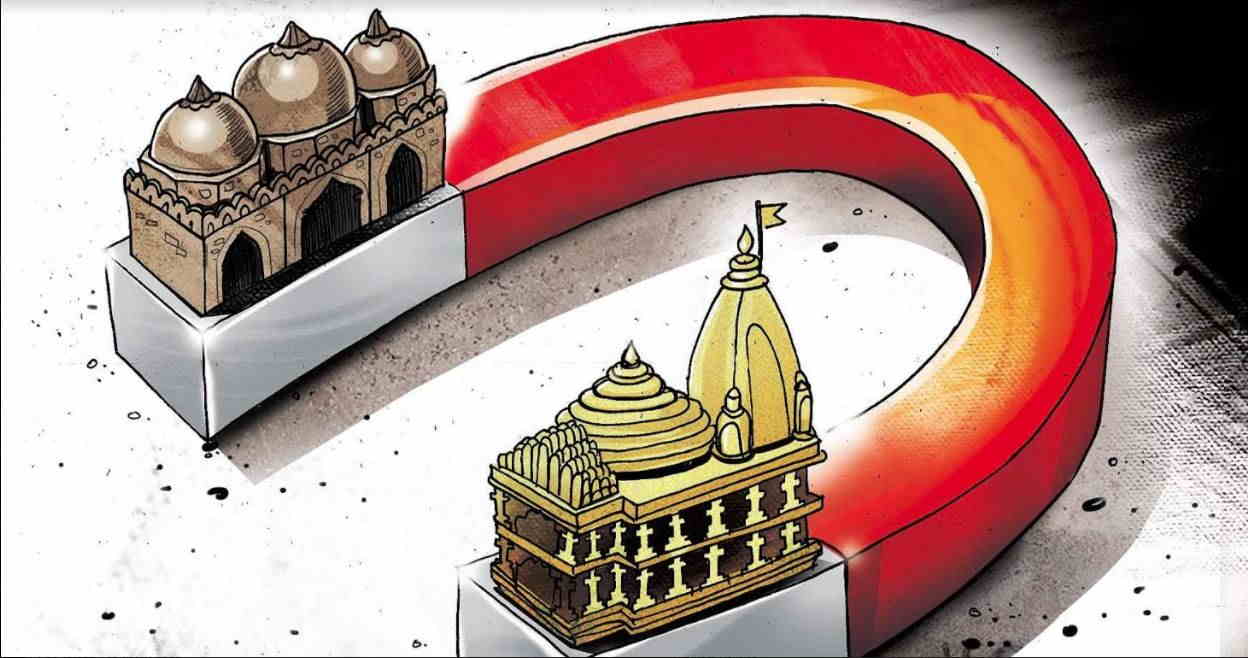[vc_row][vc_column][vc_column_text]The much-awaited final hearing in Supreme Court on the long-standing Ram Janmabhoomi-Babri Masjid title dispute on Tuesday, Dec 5, ended on expected lines with the next hearing put off till Feb 8, 2018.
Sunni Waqf Board counsel senior advocate Kapil Sibal had wanted it posted to July 15, 2019, after the Lok Sabha elections. Sibal told the apex court that there are serious repercussions outside the court whenever the matter is heard. He requested the court to take up the matter on July 15, 2019 once all the pleadings are complete. The plea was rejected.
The case was being heard by a bench headed by Chief Justice of India Dipak Misra and Justices Ashok Bhushan and S Abdul Nazeer. The bench is hearing a total of 13 appeals filed against the 2010 judgment of the Allahabad High Court in four civil suits.
The high court had ruled a three-way division of the disputed 2.77 acre area at Ayodhya among the parties between the Sunni Waqf Board, the Nirmohi Akhara and Ram Lalla.
The order was challenged before the Supreme Court on May 9, 2011, which in its verdict stayed the operation of the decree and ordered status quo of the land and other adjoining areas acquired by the Centre in 1993.
On August 11, 2017, the parties were given three months to translate all oral evidence and exhibited documents in various languages.
In the hearing on Tuesday, the court was to hear arguments and examine exhibits and documents likely to be relied upon. In pursuance to the apex court’s earlier direction, the Yogi Adityanath government had submitted English translation of exhibits and documents which were in eight different languages.
Senior advocate Kapil Sibal, reading out the details of exhibits filed by the contesting defendants before the Allahabad High Court, told the three-judge SC bench that all these exhibits had not been filed before the court.
Additional Solicitor General (ASG) Tushar Mehta, representing the state of Uttar Pradesh, rebutted Kapil Sibal’s claim and said that all the related documents and requisite translation copies were on record.
Sibal, questioning ASG Mehta’s claim, asked how could more than 19000 pages of documents be filed in such short time. Sibal also told the SC that he and other petitioners have not been provided with all relevant documents.
The SC bench asked the Advocates on Record of appeals to sit together and ensure that all the requisite documents are translated, filed and numbered before the apex court Registry. In case of any problem, the counsel were directed to consult the Registry.
Earlier, Kapil Sibal argued for deferment of the hearing on the ground that building a Ram temple at the disputed site is a part of the ruling BJP’s manifesto. “BJP leader Dr Subramanian Swamy had gone on record saying that Ram temple would be built before 2019 through legal means. They want to make it as an election manifesto and the court should not fall into the trap. These appeals are not ordinary property disputes as they go to the heart of secular fabric of the country,” Sibal said. He also said he needed time as there are 90,000 pages of documents to go through.
Senior lawyers Harish Salve and CS Vaidyanathan, representing Hindu organisations, objected, saying the court must treat the Ayodhya case like any other.
“We are shocked and surprised,” said Chief Justice of India Dipak Misra, adding that the judges were “not bothered about what’s happening outside.” He said that in August this year “all of you wanted the hearing in January and we posted today to hear the statement of facts. Now you want it to be postponed.”
On Sunday, BJP leader Subramanian Swamy had said that the construction of Ram Temple in Ayodhya will start soon and devotees will be able to celebrate the next Diwali there. Earlier, , RSS Chief Mohan Bhagwat had declared that only a mandir would come up at the disputed site and nothing else. “We will construct it. It is not a populist declaration but a matter of our faith. It will not change,” he had said.
On Tuesday, Ram Janmabhoomi Nyas chief Mahant Nritya Gopal Das said that in case the Supreme court order is not in their favour, the temple would still be built via Parliament, under Modi Narendra and Yogi Adityanath government.
“If the temple isn’t built during Modi, Yogi government then when it will be built,” said Mahant Nritya Gopal Das.
“Entire land belongs to Lord Ram,” he said.
The Vishwa Hindu Parishad (VHP), extreme Hindu wing of RSS, has declared that the construction will start from October 18, 2018. Assembly poll campaigns would be at peak at the time in BJP ruled Madhya Pradesh, Chhattisgarh and Rajasthan. It would also be only six months away from Lok Sabha polls.[/vc_column_text][/vc_column][/vc_row]


 India News15 hours ago
India News15 hours ago
 India News14 hours ago
India News14 hours ago
 India News5 hours ago
India News5 hours ago
 Cricket news5 hours ago
Cricket news5 hours ago
 India News4 hours ago
India News4 hours ago














